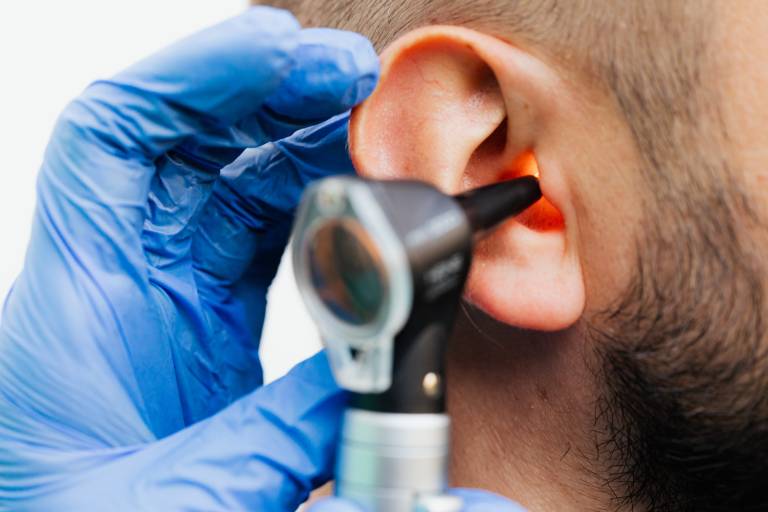Tinnitus: a clinical psychologist’s view
8 February 2024
Dr Laurence McKenna, clinical psychologist and honorary lecturer at the UCL Ear Institute, reflects on positive developments in the treatment and perception of tinnitus, and the importance of a psychological approach.

Last week I retired from the NHS after 40 years of frontline service as a clinical psychologist. Much of that was spent working with people with tinnitus.
A colleague asked if I had seen many changes in the way tinnitus is treated. It’s not an easy question and the answer is, of course, yes and no. 40 years ago, the usual response to someone asking their GP or ENT doctor for help with tinnitus was some version of “it’s called tinnitus, there is no cure, you have to learn to live with it”.
Positive change in perceptions of tinnitus
That response has not completely disappeared unfortunately, but it is much less common than it used to be. The medical and other helping professions have become more literate about tinnitus and there is a clearer understanding that people can be helped. This change was also seen in the campaigning and advocacy that takes place on behalf of the tinnitus community.
This change, in itself, is very positive. The old message made many people more anxious and worsened their experience of tinnitus.
40 years ago, if someone did get to see a specialist they were likely to be offered hearing aids (if they had hearing loss) or devices to mask the tinnitus sound. This was usually accompanied by some information about the working of the ear and some general advice about avoiding stress. This approach helped some people but not enough, and the links between theory and practice were poor.
The development of psychological approaches
Things started to change when, in the early 1980s, clinical psychologists were invited to put their minds to helping people with tinnitus.
They suggested that tinnitus distress could best be understood and alleviated using the concept of cognitive behaviour therapy (CBT). In the decades that followed, studies and clinical trials confirmed the benefits on this approach and the theory-practice links were strengthened.
More recently, we have developed a clearer realisation of the links between tinnitus and insomnia, one of the biggest impacts of tinnitus. Importantly, evidence has emerged that treating the insomnia, rather than the tinnitus, can lead to an improvement in both.
CBT does not “switch tinnitus off” but it can reduce the associated suffering and allow people to lead normal lives. The theory and practice of CBT itself has developed over the decades and with that we have seen the emergence of “acceptance”-based therapies such as mindfulness based cognitive therapy (MBCT) and acceptance and commitment therapy (ACT).
Both of these approaches have been shown to benefit people struggling with tinnitus. They are subtle therapies that require careful understanding and guidance. They suggest that much suffering and emotional exhaustion comes from fighting tinnitus (rather than from tinnitus per se).
This can be misunderstood as suggesting that the person either learns to like tinnitus or to give up in desperation and defeat. Neither of these is the intention. Rather, the idea is that by reducing failing attempts to control or remove tinnitus, the impact of tinnitus also reduces and paradoxically a greater sense of control is achieved. The energy that was maintaining the previous unsuccessful effort at control can then be placed in more life enhancing activity.
This does represent a different approach from the pursuit of a cure.
The search for a cure
The search for a cure has of course continued over the 40 years of my life in the tinnitus world. Research efforts have gone into finding a pill, and electrical, magnetic, or sound based responses have all received considerable investment. Most have produced some benefit for some people and the work goes on. It remains the case, however, that the strongest evidence in terms of tinnitus management remains with the CBT approach.
In the late 20tth and early 21st century people are often surprised to see a psychologist when attending the hospital for a tinnitus appointment. This is much less the case today. There is a greater understanding and acceptance of the role that psychology plays, not just in our mental health but in our physical health as well.
Psychologists are now to be found in a wide range of medical settings such as cancer, diabetes, pain, neurology, women’s health clinics and in intensive care. Nonetheless, there is still some hesitation to accept a psychological approach in the care of people with tinnitus, as well as in other clinical settings.
This hesitation is apparent in some, although much fewer, patients’ reluctance to engage in a psychological approach. It is also, however, apparent in the way in which health care budgets are spent. Psychology services for people with tinnitus are few and hard to access. Budgets continue to be spent on services for which there is less robust evidence. In this sense not much has changed in 40 years.
 Close
Close

